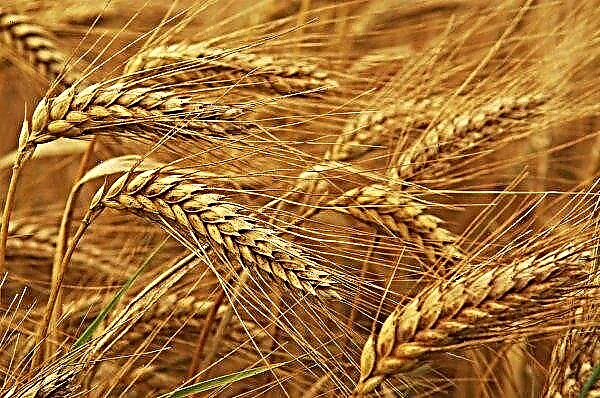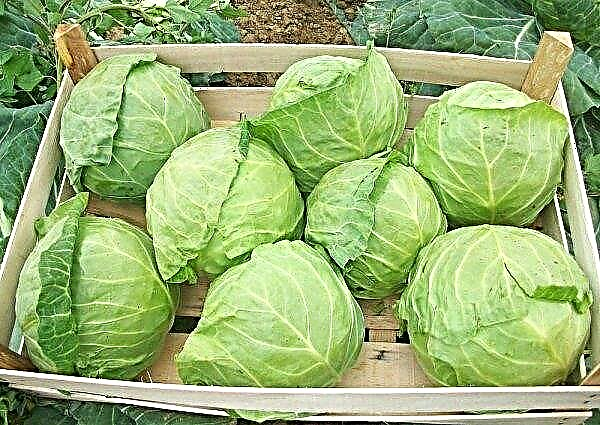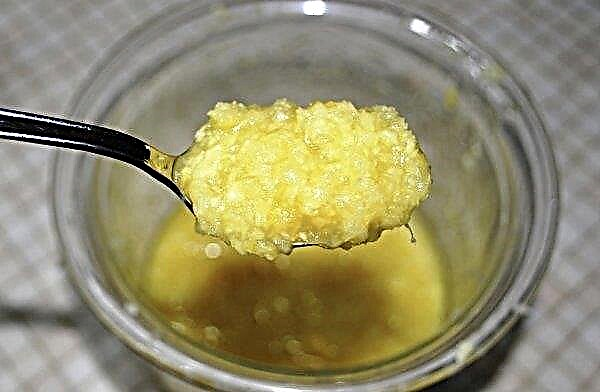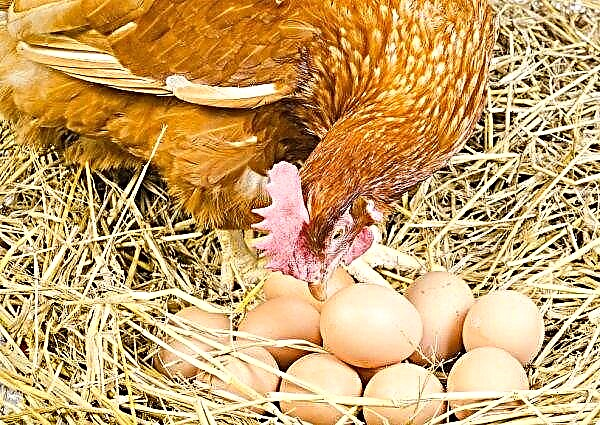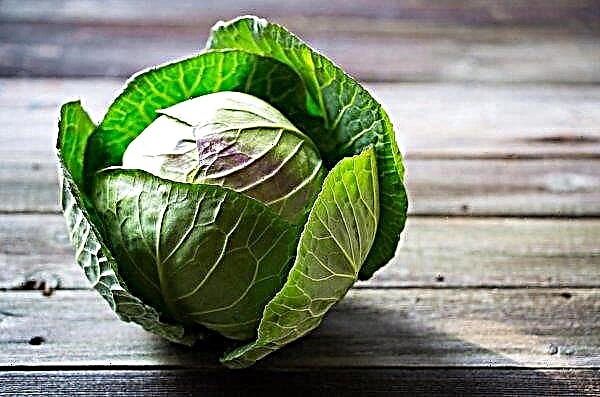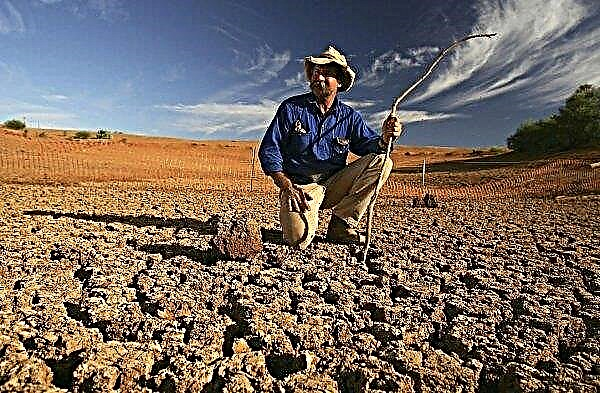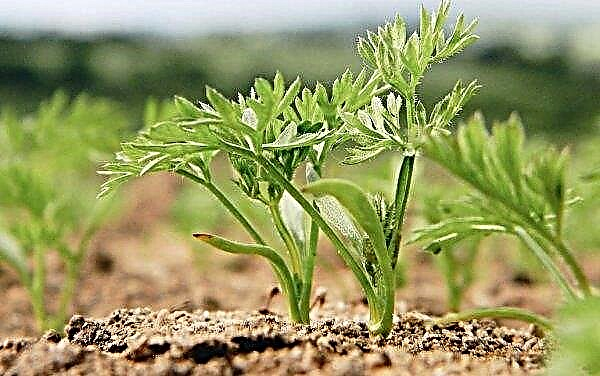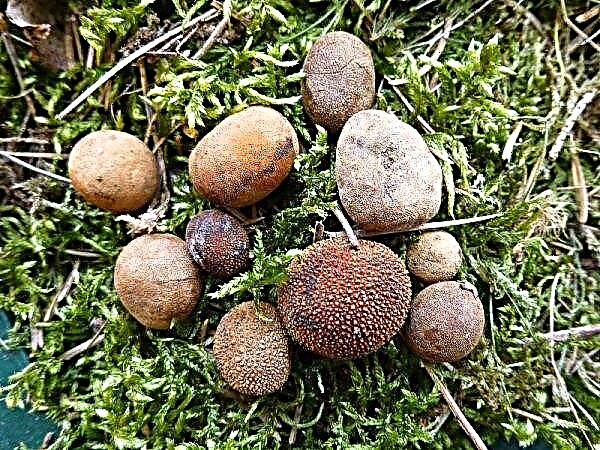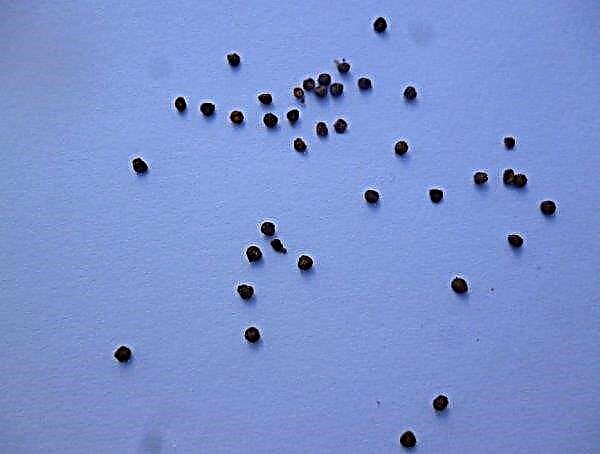Since calves still have a weak immune system, they often develop various diseases. It is important to pay attention in time to the fact that the baby is unwell and to help him. About why a small calf began to cough and with what methods to treat it, read below.
Why the calf coughs: the main reasons
Such a common symptom as a cough accompanies many diseases - colds, infectious, bacterial. Most often, it is observed in calves up to 5 months of age.  The main causes of coughing are:
The main causes of coughing are:
- non-compliance with the recommended conditions of maintenance: low air temperature, high humidity, drafts, high level of dust in the barn;
- hypothermia;
- poor nutrition and lack of vitamins and minerals, resulting in reduced immunity;
- stress as a result of a change in living conditions, separation from mother, the introduction of a new feed;
- lack of walks in the fresh air.
Did you know? Cows are well oriented in time. Even a slight delay with daily milking for 20 minutes can reduce the level of productivity by 5%, and the fat content of milk - by 0.2-0.4%.
What other concomitant symptoms may be
Cough companions are also often:
- copious discharge from the nose and eyes;
- weakness;
- refusal of food;
- depressed state;
- fever.
Diagnostics
If a cough occurs in a calf, the owner must immediately isolate it from other animals in order to avoid mass infection of the livestock and seek veterinary help. Only a veterinarian, based on an examination, information about all the symptoms, can accurately establish the diagnosis and prescribe competent treatment. If, based on the existing symptoms, it is not possible to accurately determine the disease, the specialist will prescribe additional diagnostic methods, such as:
If, based on the existing symptoms, it is not possible to accurately determine the disease, the specialist will prescribe additional diagnostic methods, such as:
- X-ray
- pulmonary biopsy;
- blood tests.
How to treat
Depending on the diagnosis, therapy will be prescribed. The veterinarian will prescribe the procedure for the owner, the medications necessary to administer the calf, and can also recommend effective folk remedies that will help the animal recover faster.
Important! It is forbidden to treat cows on their own without a veterinary education. This can worsen the condition of the animal and lead to bad consequences.
Bronchitis
Inflammation of the bronchi occurs in those animals that live in conditions where the hygiene parameters are violated: low air temperature, cold floor, excessive humidity, drafts, sudden changes in temperature, the use of cold water, inhalation of dusty air, toxic substances. It can occur in two forms - in acute and chronic. By the nature of the inflammation, purulent, catarrhal, hemorrhagic, fibrinous bronchitis is distinguished. The peak of the disease occurs in the first month of spring and the last month of autumn. With bronchitis, a dry obsessive cough first develops. After a few days, it goes wet and deaf. When the calf breathes, wheezing can be heard. If the cause of the disease is identified and eliminated in time, and medications are administered to the animal in a timely manner, then full recovery can be achieved after 7-10 days without any further consequences.
With bronchitis, a dry obsessive cough first develops. After a few days, it goes wet and deaf. When the calf breathes, wheezing can be heard. If the cause of the disease is identified and eliminated in time, and medications are administered to the animal in a timely manner, then full recovery can be achieved after 7-10 days without any further consequences.
Accurate diagnosis is made on the basis of examination, symptoms and a blood test. Treatment of bronchitis consists in the following activities:
- Isolation of the patient in a well-ventilated, moderately humid room with heating, where there are no drafts and it is possible to maintain the same temperature regime.
- Correction of the diet in the direction of increasing green, rich in vitamins and wet feed. Foods that can irritate the bronchi are crumbly, with dust, excluded.
- The introduction of expectorant and antimicrobial cough medicines: ammonium chloride (0.02-0.03 g), terpinghydrate (0.01-0.03 g / 1 kg weight), sodium bicarbonate (0.1-0.2 g), Carlsbad salt (0.1-0.2 g). Usually prescribed two or three times the introduction of liquid food for 5-7 days.
- Carrying out inhalations with sodium bicarbonate, menthol, eucalyptus infusion, etc.
- The introduction of codeine or dionine with a strong obsessive cough.
- The use of drugs that expand the bronchi in the chronic course of the disease - injections of a 5% solution of ephedrine (under the skin 7-10 ml, 1-2 times a day for 5-7 days), aminophylline (under the skin 5-8 mg / kg, 1 time, 3-5 days), trypsin, pepsin (1-2 mg / kg).
- Heated chest wall with incandescent lamps.
- Rubbing the sternum with turpentine.
Pneumonia
Inflammation of the lungs is one of the common causes of coughing. Most often, it is recorded in monthly calves in winter and autumn. The reasons that can provoke an ailment are the same as with bronchitis - violation of the conditions of detention. Against the background of not yet fully formed immunity, the kids catch a cold or get a viral, bacterial infection. Pneumonia develops as a serious complication of these diseases. In addition, the ailment can occur in case of severe overheating, as well as with a lack of vitamins A and D in the body, the presence of worms.
With pneumonia in calves, breathing becomes noticeably quicker, snot and cough appear, heavy discharge from the conjunctiva, body temperature rises. Perhaps the development of diarrhea. With pneumonia, the calf is depressed, weak, constantly lies and refuses food. If the veterinarian has accurately established that the animal has pneumonia, then he will prescribe antibiotic therapy (Tetracycline, Streptomycin, Farmazin). For the prevention of the disease, injections of Trivita, Difsela, Selevet, and Inflaret are used.
Dictation
Dictation is called a disease caused by parasites - roundworms nematodes that settle in the bronchi and trachea. Helminths are transmitted from animal to animal. They are excreted in the feces of sick cattle, and then eaten by healthy cattle along with grass or dirty contaminated water. Most often, infection occurs in the summer.
Did you know? A cow opens and closes its mouth about 30-40 thousand a day, more than half of these movements are in chewing gum.
In addition to cough, the following symptoms are observed with dictyocaulosis:
- depressed state;
- refusal of food;
- diarrhea;
- frequent breathing
- wheezing and cracking when breathing;
- secretion of mucus from the nasal passages;
- increase in body temperature;
- secretion of foam from the mouth.
 Treatment of this parasitic disease involves the following options:
Treatment of this parasitic disease involves the following options:- The introduction into the trachea of an injection of a mixture of crystalline iodine with potassium iodide (1: 1.5) heated to 27-30 degrees and water, to which distilled water (1500: 1) is added.
- The introduction of the drug "Loxuran" (40%) - 1.25 ml / 10 kg twice with an interval of 1 day.
- The introduction of the drug "Divezide" - 1.5 ml / 10 kg.
- Subcutaneous injection of “Ditrazine citrate” (25%) - 2 ml / 10 kg two days in a row, the third injection is made a day after the second.
- The use of drugs "Fenbendazole", "Ovitgelm" according to the instructions.
Tuberculosis
Tuberculosis is a dangerous disease not only for animals, but also for people. It begins with a cough, and then other symptoms join in:
- wheezing
- difficulty breathing
- temperature increase;
- refusal of food.

Preventive measures
In most cases of coughing in calves, the owner is guilty, who ignored recommendations for their maintenance and feeding. In order to prevent diseases, it is important to adhere to the following preventive measures:
- To activate the digestive and immune systems, it is necessary to give 3.8-4 liters of colostrum within 4-6 hours after calving, which at this time contains antibodies that allow the newborn to fight diseases.
- It is necessary to correctly compile the diet of animals. After birth, they need about 5.7-7.6 liters of milk per day, constant access to water. Collected milk is administered after 14 days. The first potato feed can be administered at week 4. They begin to accustom hay from the age of 20 days. New feed is introduced gradually.
- In the room where the calves are kept, maintain the temperature at + 18-20 degrees. To fall below +15 and rise above +27 the thermometer should not be. Toddlers should sleep on warm thick bedding. The room should be low humidity - 40-60%, good ventilation.
- Carry out regular cleaning and disinfection of the barn.
- Animals must walk daily.
- Vaccination should be carried out in a timely manner. Today there is an opportunity to inject vaccines against pneumonia, which is caused by viruses and bacteria.
- Twice a year it is necessary to carry out antihelminthic events.
Important! Newborn calves that did not receive colostrum and antibodies in a timely manner, subsequently get sick more often, are at risk of developing pneumonia, are prone to diarrhea during growth.
Thus, a cough in a calf may indicate the presence of a disease in the body. To establish which one, you need to consult a veterinarian. If treatment is started in a timely manner, then the sad consequences can be avoided. In order to prevent the development of cough, it is necessary to clearly monitor the conditions of the calves, walk them daily and feed them correctly.

